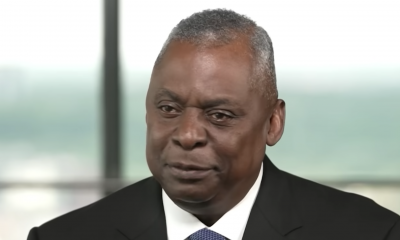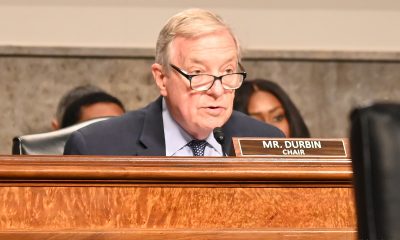National
Kagan denounces ‘Don’t Ask, Don’t Tell’
Supreme Court nominee calls gay ban ‘unwise, unjust’


U.S. Supreme Court nominee Elena Kagan was questioned this week about her handling of issues related to ‘Don’t Ask, Don’t Tell.’ (Washington Blade photo by Michael Key)
The issue of “Don’t Ask, Don’t Tell” and a controversy over allowing the U.S. military to recruit on college campuses emerged as central concerns during U.S. Supreme Court nominee Elena Kagan’s confirmation hearings this week.
The issues emerged Tuesday during the second day of hearings for Kagan — who’s currently serving as U.S. solicitor general — in testimony before the Senate Judiciary Committee, which was expected to continue throughout the week.
Sen. Jeff Sessions (R-Ala.) directed pointed questions at Kagan about the views she expressed as dean of Harvard Law School over military recruitment on campus.
According to media reports, in October 2003 Kagan wrote in an e-mail to students that military recruiting on campus caused her “deep distress” and that she “abhor[s] the military’s discriminatory recruitment policy.”
In testimony, Kagan affirmed her opposition to the ban on open service as dean and said she still holds that belief.
“I have repeatedly said that I believe that the ‘Don’t Ask, Don’t Tell’ policy is unwise and unjust,” she said. “I believed it then and I believe it now.”
Kagan said as dean she tried to ensure military recruiters had “full and complete access” while she simultaneously tried to enforce Harvard’s non-discrimination policy that bars discrimination based on sexual orientation.
She said she worked out a compromise as dean that enabled a veterans’ organization to sponsor military recruiters on campus as opposed to the U.S. military itself. Kagan noted that this policy was changed after the Defense Department voiced concerns about not having full access.
Sessions was critical of her efforts and cited examples of actions she took that he said raised doubts about her support for the U.S. military.
The ranking Republican on the Judiciary Committee, Sessions has voiced concerns about the Kagan nomination throughout the confirmation process and is a likely vote against seating her on the Supreme Court.
Sessions said Kagan participated in a campus protest and spoke out against the Solomon Amendment, which allows the U.S. government to withhold federal funding from universities if they restrict military recruitment on campus.
The senator cited a friend-of-the-court brief that Kagan signed as one of 40 Harvard professors in favor a U.S. Third Circuit Court of Appeals ruling in 2004 overturning the Solomon Amendment.
In response, Kagan characterized the brief as an argument that Harvard’s accommodation for military recruiters through a veterans’ group was consistent with the Solomon Amendment.
“We filed an amicus brief not attacking the constitutionality of the Solomon Amendment, but instead saying simply that Harvard policy complied with the Solomon Amendment,” she said.
Kagan noted that in the end, the Supreme Court unanimously rejected the arguments presented by Harvard professors in a 2006 decision upholding the Solomon Amendment.
Sessions accused Kagan of engaging in unscrupulous activity at Harvard by instituting a new policy following the Third Circuit ruling and suggested she shouldn’t have issued a change because the Solomon Amendment remained in effect.
The senator said Kagan’s description of events was “unconnected to reality” and that he was “a little taken aback” by her remarks.
“I know what happened at Harvard,” he said. “I know you’ve been [an] outspoken leader against the military policy. I know you acted — without legal authority — to reverse Harvard’s policy to deny the military equal access to campus until you were threatened by the United States government with the loss of critical funds.”
Sen. Patrick Leahy (D-Vt.), chair of the Judiciary Committee, interrupted Sessions to allow Kagan to respond to Sessions’ remarks.
Noting her father was a military veteran, Kagan said she has “respect” for the military and “one of the great privileges” of her time at Harvard was working with students who were former service members or who wanted to enter the military.
Doug NeJaime, a gay law professor at Loyola Law School, said Kagan “took the position that we expected her to take” in response to Sessions’ questioning by explaining school policy on military recruitment.
“I don’t think this is huge issue because, I think, it’s very much in the mainstream of law schools’ decision-making around ‘Don’t Ask, Don’t Tell’ and the Solomon Amendment,” NeJaime said. “And so, I think she defended the position in a satisfactory way.”
NeJaime said Sessions was trying to make it seem that Kagan was trying to undermine the U.S. military during her tenure as dean, or prevent them having access to students.
“She made it very clear that that’s not what she was doing,” NeJaime said. “The military had access to the students, and students had access to the military, and she had great respect for the military.”
Kagan’s opposition to “Don’t Ask, Don’t Tell” — which she articulated during her confirmation hearings — renews the question of whether she would have to recuse herself if confirmed and the issue came before the high court.
But NeJaime said he didn’t think such statements meant that Kagan wouldn’t be able to take part in a case on “Don’t Ask, Don’t Tell.”
“She’s been pretty clear about speaking about it as a political matter and as an ethical matter,” NeJaime said. “She thinks it’s a bad policy, but I don’t think that that means she can’t fairly adjudicate equal protection or due process claims raised by the ‘Don’t Ask, Don’t Tell’ policy.”
Further questions arose about LGBT cases in which Kagan may have to recuse herself in light of Leahy’s questioning on what matters she believed she would have sit out if they came to the bench.
In response to Leahy’s questioning, Kagan said she would recuse herself in cases that came before the court if she had been a “counsel of record” in any state of the process for litigation.
“I think there are probably about 10 cases that are on the docket next year … in which I have been a counsel of record in a petition for certiorari” or played a similar role, she said.
During her tenure as solicitor general, the Justice Department issued several briefs in defense of “Don’t Ask, Don’t Tell” — as well as the Defense of Marriage Act — in response to legal challenges in federal courts.
But NeJaime said the briefs don’t represent Kagan acting as a counsel of record because they originated under the jurisdiction of U.S. Attorney General Eric Holder.
“She’s in the solicitor general’s office whereas the papers filed in the DOMA cases have been coming from the Justice Department,” NeJaime said. “So she actually hasn’t been counsel of record on any cases implicating the Defense of Marriage Act, so I don’t see any problem there.”
NeJaime added this situation would also apply with respect to Justice Department’s response to legal challenges of “Don’t Ask, Don’t Tell.”
State Department
HIV/AIDS activists protest at State Department, demand full PEPFAR funding restoration
Black coffins placed in front of Harry S. Truman Building

Dozens of HIV/AIDS activists on Thursday gathered in front of the State Department and demanded the Trump-Vance administration fully restore President’s Emergency Plan for AIDS Relief funding.
Housing Works CEO Charles King, Health GAP Executive Director Asia Russell, Human Rights Campaign Senior Public Policy Advocate Matthew Rose, and others placed 206 black Styrofoam coffins in front of the State Department before the protest began.
King said more than an estimated 100,000 people with HIV/AIDS will die this year if PEPFAR funding is not fully restored.
“If we continue to not provide the PEPFAR funding to people living in low-income countries who are living with HIV or at risk, we are going to see millions and millions of deaths as well as millions of new infections,” added King.
Then-President George W. Bush in 2003 signed legislation that created PEPFAR.
The Trump-Vance administration in January froze nearly all U.S. foreign aid spending for at least 90 days. Secretary of State Marco Rubio later issued a waiver that allows the President’s Emergency Plan for AIDS relief and other “life-saving humanitarian assistance” programs to continue to operate during the freeze.
The Washington Blade has previously reported PEPFAR-funded programs in Kenya and other African countries have been forced to suspend services and even shut down because of a lack of U.S. funding. Two South African organizations — OUT LGBT Well-being and Access Chapter 2 — that received PEPFAR funding through the U.S. Agency for International Development and the Centers for Disease Control and Prevention in recent weeks closed down HIV-prevention programs and other services to men who have sex with men.
Rubio last month said 83 percent of USAID contracts have been cancelled. He noted the State Department will administer those that remain in place “more effectively.”
“PEPFAR represents the best of us, the dignity of our country, of our people, of our shared humanity,” said Rose.
Russell described Rubio as “ignorant and incompetent” and said “he should be fired.”
“What secretary of state in 90 days could dismantle what the brilliance of AIDS activism created side-by-side with George W. Bush? What kind of fool could do that? I’ll tell you who, the boss who sits in the Harry S. Truman Building, Marco Rubio,” said Russell.

U.S. Military/Pentagon
Pentagon urged to reverse Naval Academy book ban
Hundreds of titles discussing race, gender, and sexuality pulled from library shelves

Lambda Legal and the Legal Defense Fund issued a letter on Tuesday urging U.S. Defense Secretary Pete Hegseth to reverse course on a policy that led to the removal of 381 books from the Nimitz Library of the U.S. Naval Academy in Annapolis, Md.
Pursuant to President Donald Trump’s executive order 14190, “Ending Radical Indoctrination in K-12 Schooling,” the institution screened 900 titles to identify works promoting “diversity, equity, and inclusion,” removing those that concerned or touched upon “topics pertaining to the experiences of people of color, especially Black people, and/or LGBTQ people,” according to a press release from the civil rights organizations.
These included “I Know Why the Caged Bird Sings” by Maya Angelou, “Stone Fruit” by Lee Lai, “The Hate U Give” by Angie Thomas, “Lies My Teacher Told Me: Everything Your American History Textbook Got Wrong” by James W. Loewen, “Gender Queer: A Memoir” by Maia Kobabe, and “Democracy in Black: How Race Still Enslaves the American Soul” by Eddie S. Glaude, Jr.
The groups further noted that “the collection retained other books with messages and themes that privilege certain races and religions over others, including ‘The Clansman: A Historical Romance of the Ku Klux Klan’ by Thomas Dixon, Jr., ‘Mein Kampf’ by Adolf Hitler, and ‘Heart of Darkness’ by Joseph Conrad.
In their letter, Lambda Legal and LDF argued the books must be returned to circulation to preserve the “constitutional rights” of cadets at the institution, warning of the “danger” that comes with “censoring materials based on viewpoints disfavored by the current administration.”
“Such censorship is especially dangerous in an educational setting, where critical inquiry, intellectual diversity, and exposure to a wide array of perspectives are necessary to educate future citizen-leaders,” Lambda Legal Chief Legal Officer Jennifer C. Pizer and LDF Director of Strategic Initiatives Jin Hee Lee said in the press release.
Federal Government
White House sues Maine for refusing to comply with trans athlete ban
Lawsuit follows months-long conflict over school sports in state

The Justice Department is suing the state of Maine for refusing to comply with President Donald Trump’s executive order banning transgender athletes from participating in school sports, U.S. Attorney General Pam Bondi announced on Wednesday.
DOJ’s lawsuit accuses the state of violating Title IX rules barring sex discrimination, arguing that girls and women are disadvantaged in sports and deprived of opportunities like scholarships when they must compete against natal males, an interpretation of the statute that reverses course from how the law was enforced under the Biden-Harris administration.
“We tried to get Maine to comply” before filing the complaint, Bondi said during a news conference. She added the department is asking the court to “have the titles return to the young women who rightfully won these sports” and may also retroactively pull federal funding to the state for refusing to comply with the ban in the past.
Earlier this year, the attorney general sent letters to Maine, California, and Minnesota warning the blue states that the department “does not tolerate state officials who ignore federal law.”
According to the Maine Principals’ Association, only two trans high school-aged girls are competing statewide this year. Conclusions from research on the athletic performance of trans athletes vis-a-vis their cisgender counterparts have been mixed.
Trump critics and LGBTQ advocates maintain that efforts to enforce the ban can facilitate invasive gender policing to settle questions about an individual athlete’s birth sex, which puts all girls and women at risk. Others believe determinations about eligibility should be made not by the federal government but by school districts, states, and athletics associations.
Bondi’s announcement marked the latest escalation of a months-long feud between Trump and Maine, which began in February when the state’s Democratic governor, Janet Mills, declined to say she would enforce the ban.
Also on Wednesday, U.S. Education Secretary Linda McMahon said the findings from her department’s Title IX investigation into Maine schools — which, likewise, concerned their inclusion of trans student-athletes in competitive sports — was referred to DOJ.
Earlier this month, the Justice Department pulled $1.5 million in grants for Maine’s Department of Corrections because a trans woman was placed in a women’s correctional facility in violation of a different anti-trans executive order, while the U.S. Department of Agriculture paused the disbursement of funds supporting education programs in the state over its failure to comply with Title IX rules.
A federal court last week ordered USDA to unfreeze the money in a ruling that prohibits the agency from “terminating, freezing, or otherwise interfering with the state’s access to federal funds based on alleged Title IX violations without following the process required by federal statute.”
-

 District of Columbia4 days ago
District of Columbia4 days agoFinal push to raise funds, fill D.C. hotels as WorldPride nears
-

 El Salvador2 days ago
El Salvador2 days agoGay Venezuelan makeup artist remains in El Salvador mega prison
-

 District of Columbia4 days ago
District of Columbia4 days agoReenactment of 1965 gay rights protest at White House set for April 17
-

 Maryland4 days ago
Maryland4 days agoFreeState Justice: Transgender activist ‘hijacked’ Moore’s Transgender Day of Visibility event












